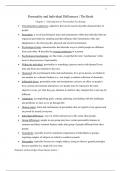1
Personality and Individual Differences | The Book
Chapter 1 | Introduction to Personality Psychology
• Trait descriptive adjectives: adjectives that can be used to describe characteristics of
people.
• Personality: a set of psychological traits and mechanisms within the individual that are
organised and relatively enduring and that influence their interactions with, and
adaptations to, the intra psychic, physical and social environments.
• Psychological traits: characteristics that describe ways in which people are different
from each other à describe the average tendencies of a person.
• Psychological mechanisms: are like traits, except that the term ‘mechanisms’ refers
more to the processes of personality.
• Within the individual: personality is something a person carries with themself over
time and from one situation to the next.
• Organised: the psychological traits and mechanisms, for a given person, are linked to
one another in a coherent fashion (i.e., not simply a random collection of elements).
• Influential forces: personality traits and mechanisms can have an effect on people's
lives. person-environment interaction: two people may be exposed to the same
objective event, yet what they pay attention to and how they interpret the event may be
different.
• Adaptation: accomplishing goals, coping, adjusting, and dealing with the challenges
and problems we face as we go through life.
• Human nature: traits and mechanisms of personality that are typical of our species and
are posed by (nearly) everyone.
• Individual differences: ways in which each person is like some other people.
• Group differences: people in one group may have certain personality features in
common and these common features make that group of people different from other
groups.
• Nomothetic: typically involves statistical comparisons of individuals or groups,
requiring samples of subjects on which to conduct research.
• Idiographic: typically focuses on a single subject, trying to observe general principles
that are manifest in a single life over time.
Domains of knowledge about human nature !
, 2
• Domain of knowledge: speciality area of science and scholarship, in which
psychologists have focused on learning about some specific and limited aspects of
human nature.
1) Dispositional domain: deals centrally with the ways in which individuals are disposed
to behave and why these dispositions differ from one another.
2) Biological domain: assumes that humans are collections of biological systems, and
these systems provide building blocks for behaviour, thought and emotion.
- Psychophysiology: researchers summarise what is known about the basis of
personality in terms of nervous system functioning.
3) Intra psychic domain: deals with the mental mechanisms of personality. many of
which operate outside of conscious awareness.
4) Cognitive-experiential domain: focuses on cognition and subjective experience such as
con-scious thoughts, feelings, beliefs and desires about oneself and others.
5) Social and cultural domain: assumes that personality is not something that merely
resides within the heads, nervous systems and genes of individuals. Rather, personality
affects, and is affected by, the social and cultural context.
6) Adjustment domain: refers to the fact that personality plays a key role in how we cope
with, and adapt and adjust to, the struggles in our daily lives.
• Theories vs Beliefs:
- Theories: tested by systematic observations that can be repeated by others and that
yield similar conclusions.
- Beliefs: based on faith often personally useful and crucially important to some
people.
5 Standards for evaluating personality theories
STANDARD DEFINITION
Comprehensiveness Explains most or all known facts.
Heuristic value Guides researchers to important new
discoveries.
Testability Makes precise predictions that can
empirically be tested.
Parsimony Contains few premises or assumptions.
, 3
Compatibility and integration Consistent with what is known in other
domains; can be coordinated with other
branches of scientific knowledge.
, 4
Chapter 2 | Personality Assessment, Measurement, and Research Design
• Self-report data (S-data): information a person reveals.
• Structured personality tests: forced-choice true-or-false questions.
• Experience sampling: people answer some questions every day for several weeks or
longer.
• Observer-report data (O-data): information about people we observe.
• Multiple social personalities: display of different sides of ourselves to different people.
• Test data (T-data): participants are placed in a standardised test situation.
- Projective techniques: person is given a standard stimulus and asked what they see.
• Life-outcome data (L-data): refers to information that can be gleaned from events.
acti-vities and outcomes in a person's life that are available to public scrutiny.
• Aggregation: the process of adding up, or averaging, several single observations,
resulting in a better measure of a personality trait than a single observation of
behaviour.
• Response set = non-content responding
• Acquiescence = yea-saying
• Extreme responding: always answering the lowest or highest response and avoiding
the middle scale.
Types of Validity
• Validity: refers to the extent to which a test measures what it claims to measure.
- Face validity: refers to whether a test, on the surface, appears to measure what it is
supposed to measure.
- Predictive/criterion validity: refers to whether a test predicts criteria external to the
test.
- Convergent validity: refers to whether a test correlates with other measures that it
should correlate with.
- Discriminant validity: refers to what a measure should not correlate with.
- Construct validity: a test that measures what it claims to measure.
• Generates ability: the degree to which the measure retains its validity across various
contexts.
• Conceptual definition: clear definition of what is measured.
• Correlational method: a statistical procedure is used for determining whether or not
there is a relationship between two variables.





